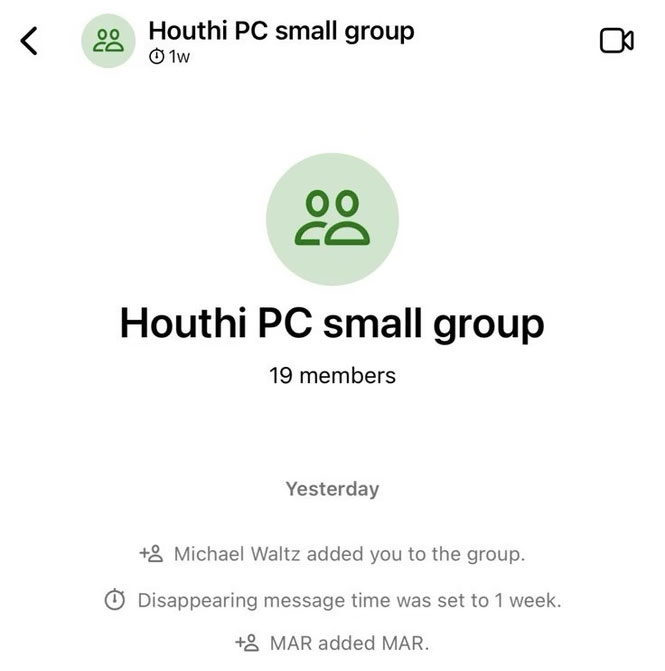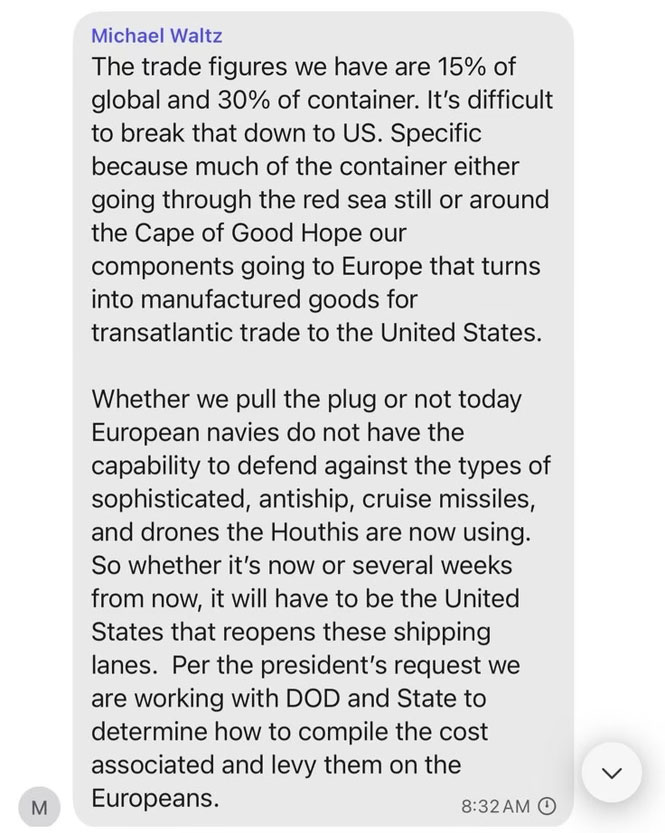

Us officials chat about the Red Sea
On March 24, local time, CCTV reporters learned that the White House admitted on the same day that several senior officials of the Trump administration used an unclassified chat application to discuss highly sensitive military plans, which inadvertently added a reporter from the Atlantic Monthly into a group chat called "Houthi PC Group".
On March 26, local time, The Atlantic published online further information that its reporters had taken from a group chat in response to the White House's aggressive counterattack, including the US military plans in the waters of the Red Sea.
In the group chat, a debate began among top U.S. government officials over whether fighting the Houthis is in line with U.S. President Donald Trump's foreign policy. Since the outbreak of the Israeli-Palestinian conflict, Yemen's Houthi armed group has launched attacks on international ships passing through the Red Sea route.
"The Suez Canal accounts for only 3 per cent of US trade but 40 per cent of European trade," Mr Vance said. It is likely that the public simply does not understand the difference or the need for action. As the president has said, the strongest case for action is to send a signal - but I doubt he realizes that this contradicts his current statements on Europe. More alarming is the possibility of a moderate to severe spike in oil prices."
Waltz responded that available trade data showed the route accounted for 15 percent of global trade and 30 percent of container traffic: "But it is difficult to accurately disaggregate the U.S. share." Because most of the components, whether they go through the Red Sea or in containers around the Cape of Good Hope, are first shipped to Europe to be finished and then to the United States through transatlantic trade."
Waltz went on to reply that, regardless of whether the US ends the operation today, European navies are powerless to defend against the advanced anti-ship cruise missiles and drones currently being used by the Houthis. So whether now or in a few weeks, the task of reopening the shipping lanes will fall to the United States. Walz also said the Trump administration plans to make European countries pay for the operations.
Both Vance and Hegseth oppose shifting the costs to European countries. "It's sad," Hegseth said. But Michael is right that globally (at least in our camp), we are the only ones who can do this, and no other country can even touch it. The question is timing - now that the president has given the order to reopen the waterway, I think the time is right now. The recommendation is to act immediately, but the final decision rests with the president, who has 24 hours to consider it."

On March 26, local time, The Atlantic published online further information that its reporters had taken from a group chat in response to the White House's aggressive counterattack, including the US military plans in the waters of the Red Sea.
In the group chat, a debate began among top U.S. government officials over whether fighting the Houthis is in line with U.S. President Donald Trump's foreign policy. Since the outbreak of the Israeli-Palestinian conflict, Yemen's Houthi armed group has launched attacks on international ships passing through the Red Sea route.
"The Suez Canal accounts for only 3 per cent of US trade but 40 per cent of European trade," Mr Vance said. It is likely that the public simply does not understand the difference or the need for action. As the president has said, the strongest case for action is to send a signal - but I doubt he realizes that this contradicts his current statements on Europe. More alarming is the possibility of a moderate to severe spike in oil prices."
Waltz responded that available trade data showed the route accounted for 15 percent of global trade and 30 percent of container traffic: "But it is difficult to accurately disaggregate the U.S. share." Because most of the components, whether they go through the Red Sea or in containers around the Cape of Good Hope, are first shipped to Europe to be finished and then to the United States through transatlantic trade."
Waltz went on to reply that, regardless of whether the US ends the operation today, European navies are powerless to defend against the advanced anti-ship cruise missiles and drones currently being used by the Houthis. So whether now or in a few weeks, the task of reopening the shipping lanes will fall to the United States. Walz also said the Trump administration plans to make European countries pay for the operations.

Both Vance and Hegseth oppose shifting the costs to European countries. "It's sad," Hegseth said. But Michael is right that globally (at least in our camp), we are the only ones who can do this, and no other country can even touch it. The question is timing - now that the president has given the order to reopen the waterway, I think the time is right now. The recommendation is to act immediately, but the final decision rests with the president, who has 24 hours to consider it."





